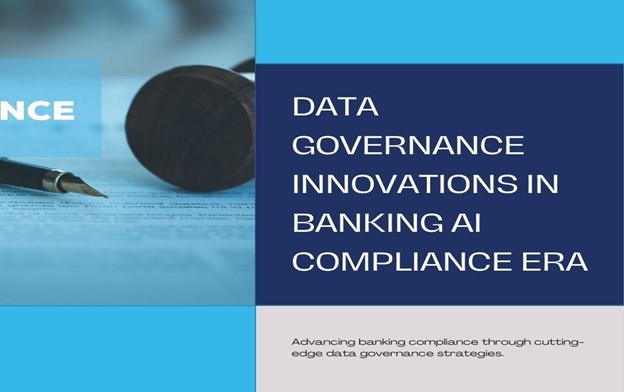Innovations in Data Governance for AI in Banking: A New Era of Compliance and Trust

The banking industry is undergoing a significant transformation with the integration of Artificial Intelligence (AI) to enhance operational efficiency, customer experiences, and overall competitiveness. However, this transformation brings new challenges in data governance, particularly concerning the integrity, security, and ethical use of data. This article delves into the intricacies of developing robust data governance frameworks that ensure compliance with regulations and foster trust among stakeholders.
The Importance of Data Governance in AI Implementation
Data governance encompasses the policies, processes, and roles that govern data management. In the context of AI, robust data governance frameworks are essential to ensure that the data used by AI systems is accurate, secure, and used ethically. According to a survey by the Global Association of Risk Professionals (GARP), 78% of banking executives believe that effective data governance is critical for the successful adoption of AI technologies.
The regulatory landscape is a crucial driver of data governance in banking. Regulations like the General Data Protection Regulation (GDPR) in the European Union and the California Consumer Privacy Act (CCPA) in the United States set stringent guidelines for data collection, processing, and storage. Non-compliance with these regulations can result in hefty fines. For instance, British Airways was fined £183 million under GDPR for a data breach that compromised the personal information of approximately 500,000 customers. Similarly, the Federal Trade Commission (FTC) imposed a $5 billion fine on Facebook for privacy violations related to the Cambridge Analytica scandal.
Key Principles of Data Governance for AI
Banks must establish comprehensive policies for data collection, usage, and sharing tailored to AI applications, covering data quality, lineage, and access controls. A BIS survey found that 85% of banks have formal data governance policies for AI.
Ensuring data quality is crucial, as poor data can lead to biased AI models, costing organizations an average of $15 million annually, according to Gartner. Banks should implement rigorous data validation and cleansing processes. Protecting sensitive information through role-based access control, multi-factor authentication, and data encryption is essential, with the Ponemon Institute reporting an average data breach cost of $5.85 million in the financial sector.
Adhering to data privacy regulations and implementing robust security measures, including pseudonymization and regular audits, are vital, given the $18.5 million average annual cybercrime cost for financial services, as per Accenture. Ethical AI deployment requires sensitivity analysis, fairness testing, and explainable AI to prevent discriminatory outcomes.
Integrating AI into Existing Data Governance Frameworks
To effectively integrate AI into existing data governance frameworks, banks must adopt a holistic approach that considers the unique challenges posed by AI technologies. This involves conducting thorough risk assessments, establishing dedicated governance structures, and defining clear roles and responsibilities.
A study by Deloitte found that 63% of financial institutions have established dedicated AI risk assessment frameworks. These frameworks evaluate risks related to data quality, model bias, and algorithmic transparency. Additionally, 78% of financial institutions have implemented formal model validation processes, including independent testing and review of AI models before deployment.
Transparency and Accountability
Transparency and accountability are critical for building trust in AI adoption within the banking industry. Banks must be transparent about their use of AI technologies, providing clear explanations to customers about how their data is used and how AI systems make decisions. A study by the Capgemini Research Institute found that 87% of consumers expect clear and transparent communication about the use of their data in AI systems.
Accountability mechanisms, such as regular reporting and independent audits, are essential for demonstrating a bank’s commitment to responsible AI use. These practices help build trust among regulators and stakeholders and ensure ongoing compliance with relevant regulations and ethical standards.
In all, the successful adoption of AI in the banking industry hinges on the development of robust and comprehensive data governance frameworks. By establishing clear policies, ensuring data quality, implementing access controls, and addressing data privacy and security concerns, banks can harness the transformative potential of AI while maintaining compliance with regulations and fostering trust among stakeholders. Transparency and accountability are crucial for building a positive perception of AI adoption in banking, ultimately driving innovation and improving customer experiences. Giriprasad Manoharan’s insights were really helpful in taking the data governance and AI implementation further.
Read More From Techbullion And Businesnewswire.com





